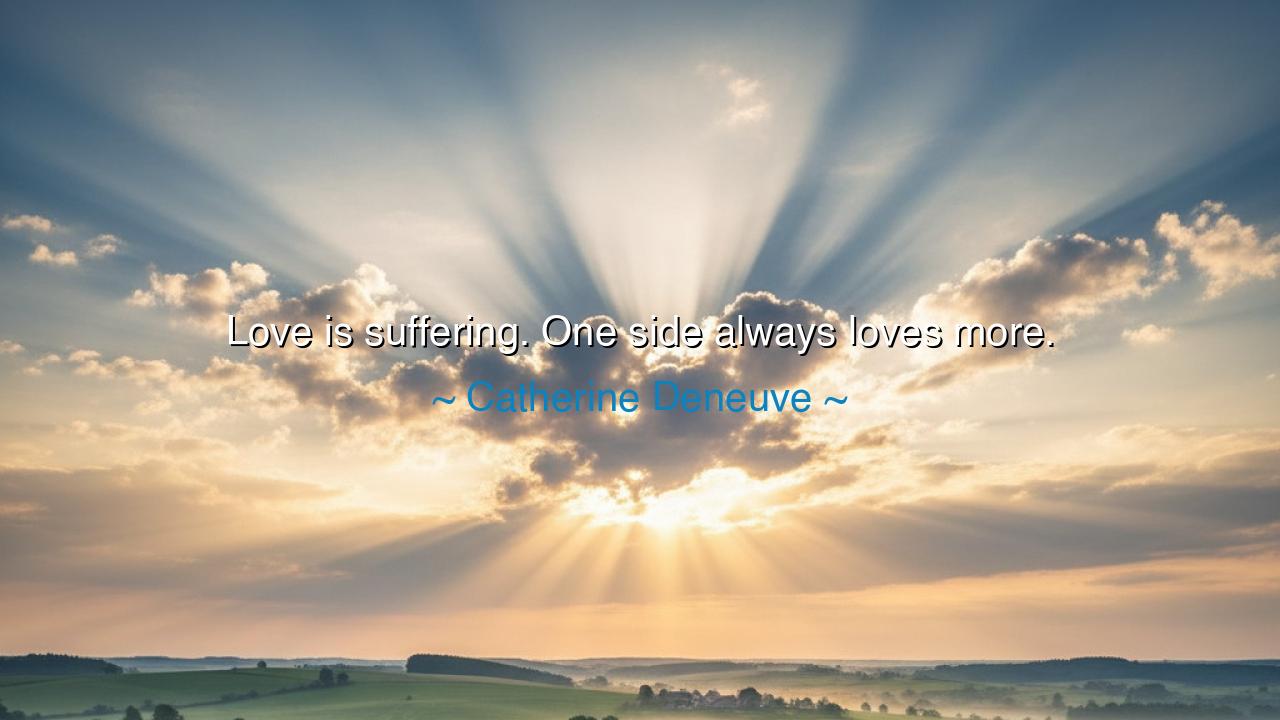
Love is suffering. One side always loves more.






“Love is suffering. One side always loves more.” – Catherine Deneuve
Thus spoke Catherine Deneuve, the timeless embodiment of grace and melancholy, whose words pierce through the illusions that veil the heart. In this haunting truth, she exposes the hidden imbalance that so often lies at the core of love — that where affection exists between two souls, it is rarely equal. One heart always burns more brightly, one gives more deeply, one suffers more silently. Love, then, becomes not merely a joy, but a form of suffering — the sacred ache of devotion that demands surrender without promise of return.
When Deneuve says, “Love is suffering,” she does not mean that love is cruel or unworthy; she means that love’s very nature requires vulnerability. To love is to risk. To open one’s heart is to place it in another’s hands, knowing it may tremble, bleed, or break. And when she adds, “One side always loves more,” she speaks the ancient truth of imbalance — that love, by its essence, cannot be measured or divided evenly. One person will always give more, wait longer, forgive faster. In this asymmetry lies both the tragedy and the beauty of love: that it teaches us to care without condition, to suffer and yet to grow.
The origin of this insight lies deep in Deneuve’s own life and artistry. Known for her cool elegance on screen, she portrayed women of deep emotion hidden behind masks of composure — women who loved fiercely, often silently. Her quote echoes centuries of wisdom born from the human heart. In love, she suggests, suffering is not failure but evidence of depth. Those who have loved greatly have all known the cost: Antony for Cleopatra, Héloïse for Abelard, Napoléon for Joséphine. In each, one heart carried more of the weight, and yet from that imbalance came immortal devotion — proof that love’s endurance is tested by its pain.
Consider the tale of Héloïse and Abelard, two lovers bound by intellect and passion, yet torn apart by fate and faith. Their letters, written through years of separation, still tremble with longing. Abelard, a man of reason, sought peace in religion; Héloïse, a woman of fierce intellect and spirit, could never silence her love. “God knows I never sought anything in you but yourself,” she wrote. In their story, Héloïse loved more — and so she suffered more. Yet her suffering did not destroy her; it became her immortality. For it is always the one who loves more deeply who understands the true nature of love’s fire.
The ancients, too, spoke of this paradox. Sophocles wrote that “one word frees us of all the weight and pain of life: that word is love.” Yet in that same breath, he knew that love and pain are inseparable. Euripides said, “Those whom the gods love die young,” for the intensity of love consumes as it illuminates. And Plato, in his divine irony, taught that love is the wound of the soul that drives us toward beauty and truth. Thus, to suffer in love is not merely to be wounded — it is to be awakened. Only through loss, through longing, through unbalanced devotion, do we begin to understand what it means to truly feel.
Yet Deneuve’s wisdom is not despair. Her words do not curse love — they reveal its price. Love, when pure, is not a transaction but a gift freely given, even when it is not equally returned. The one who loves more carries the sorrow of imbalance, but also the strength of generosity. They touch something divine — the ability to love without guarantee, to give without counting the cost. Such love, though painful, ennobles the soul. It burns away selfishness and leaves behind the essence of humanity itself: the capacity to feel deeply, even when it hurts.
So, my listener, take this truth to heart: do not fear the suffering that love brings. To love is to live in the realm of gods and mortals alike — where ecstasy and anguish are woven into one. If you find yourself loving more, do not see it as weakness, but as courage. You have been chosen to bear the greater weight of the heart, and through that burden, you grow closer to the infinite. For love that never suffers never learns, and a heart that never breaks never awakens.
In the end, Deneuve’s words remind us that love is not meant to be balanced, but beautiful in its imbalance. It is the uneven flame that lights the path of humanity. And though one may suffer more, it is through that suffering that love achieves its highest form — selfless, timeless, and true.






AAdministratorAdministrator
Welcome, honored guests. Please leave a comment, we will respond soon